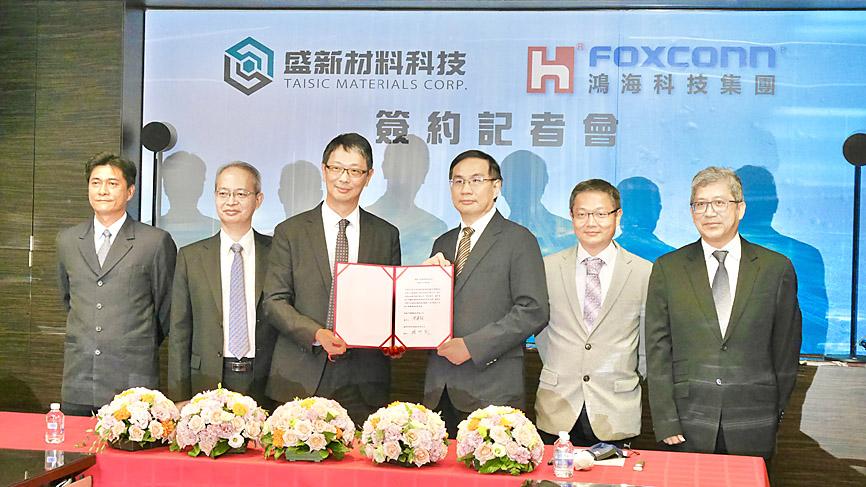Hon Hai Precision Industry Co (鴻海精密), which assembles electric vehicles for Fisker Inc and Lordstown Motors Corp, yesterday signed an agreement with Taisic Material Corp (盛新材料) to invest NT$500 million (US$16.79 million) by subscribing to Taisic’s share issue through its investment subsidiary, the latest in a slew of steps made by Hon Hai to build an electric vehicle chip ecosystem.
The deal with Taisic would help Hon Hai gain better access to silicon carbide (SiC) substrates, a key component in building electric vehicles, it said in a statement.
The investment would give Hon Hai a 10 percent stake in Taisic, one of the very few Taiwanese companies capable of producing multiple types of 6-inch SiC.

Photo, Fang Wei-chieh, Taipei Times
“SiC substrate is a key part of the electric vehicle supply chain, as it accounts for a large portion of overall SiC semiconductor costs,” Bob Chen (陳偉銘), president of Hon Hai’s semiconductor business group, said in the statement.
“The company hopes to have better control of SiC substrate supply via this investment,” he said.
To broaden its semiconductor portfolio, Hon Hai in May acquired a 30 percent stake in Advanced Power Electronics Corp (APEC, 富鼎) for about NT$2.89 billion through XSemi Corp (國創半導體), a semiconductor joint venture with passive component supplier Yageo Corp (國巨).
APEC is one of the nation’s biggest makers of metal-oxide semiconductor field-effect transistors (MOSFET), a device that is widely used for switching and to amplify electronic signals.
Hon Hai yesterday said that it expects this year to complete the deployment of its first SiC production line in Hsinchu at a 6-inch fab it purchased last year from Macronix International Co (旺宏電子).
That would provide a strong base for Hon Hai to tap into auto chips, it said.
Hon Young Semiconductor Corp (鴻揚半導體) helps operate the chip production line.

Intel Corp chief executive officer Lip-Bu Tan (陳立武) is expected to meet with Taiwanese suppliers next month in conjunction with the opening of the Computex Taipei trade show, supply chain sources said on Monday. The visit, the first for Tan to Taiwan since assuming his new post last month, would be aimed at enhancing Intel’s ties with suppliers in Taiwan as he attempts to help turn around the struggling US chipmaker, the sources said. Tan is to hold a banquet to celebrate Intel’s 40-year presence in Taiwan before Computex opens on May 20 and invite dozens of Taiwanese suppliers to exchange views

Application-specific integrated circuit designer Faraday Technology Corp (智原) yesterday said that although revenue this quarter would decline 30 percent from last quarter, it retained its full-year forecast of revenue growth of 100 percent. The company attributed the quarterly drop to a slowdown in customers’ production of chips using Faraday’s advanced packaging technology. The company is still confident about its revenue growth this year, given its strong “design-win” — or the projects it won to help customers design their chips, Faraday president Steve Wang (王國雍) told an online earnings conference. “The design-win this year is better than we expected. We believe we will win

Chizuko Kimura has become the first female sushi chef in the world to win a Michelin star, fulfilling a promise she made to her dying husband to continue his legacy. The 54-year-old Japanese chef regained the Michelin star her late husband, Shunei Kimura, won three years ago for their Sushi Shunei restaurant in Paris. For Shunei Kimura, the star was a dream come true. However, the joy was short-lived. He died from cancer just three months later in June 2022. He was 65. The following year, the restaurant in the heart of Montmartre lost its star rating. Chizuko Kimura insisted that the new star is still down

While China’s leaders use their economic and political might to fight US President Donald Trump’s trade war “to the end,” its army of social media soldiers are embarking on a more humorous campaign online. Trump’s tariff blitz has seen Washington and Beijing impose eye-watering duties on imports from the other, fanning a standoff between the economic superpowers that has sparked global recession fears and sent markets into a tailspin. Trump says his policy is a response to years of being “ripped off” by other countries and aims to bring manufacturing to the US, forcing companies to employ US workers. However, China’s online warriors